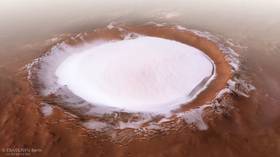US planning military infrastructure in Australia, amid tensions with Beijing
The US is planning on building military infrastructure in Australia. Though the plans fall under a defense agreement signed in 2011, their mention this week comes at a time of increased tension between Washington and Beijing.
Australia’s Foreign Minister Marise Payne announced the plans on Tuesday, stating that the “development of facilities will support the Force Posture Initiatives,” a series of military cooperation agreements reached by the US and Australia in 2011.
Though Payne did not say what kind of infrastructure the US would build, a report by ABC Australia last month revealed that behind-the-scenes planning has been underway for a naval base in the northern city of Darwin, and another report on Sunday revealed that $211.5 million had been set aside for the project inside a draft of the US Senate’s annual defense bill.
Also on rt.com ‘This is slander’: China says US criticism over South China Sea prevents resolution of disputesPayne discussed the infrastructure plan in terms of military cooperation, alhthough Washington’s eyes will likely remain fixed north once the base is built. The US has repeatedly sounded the alarm over China’s growing military confidence in the South and East China Seas, and has sailed its warships through contested waterways to reinforce its “freedom of navigation” claims.
Earlier this month, the US State Department condemned Beijing’s “repeated provocative actions” towards other Southeast Asian countries over offshore oil and gas deposits, and National Security Advisor John Bolton warned that “China’s coercive behavior towards its Southeast Asian neighbors is counterproductive & threatens regional peace & stability.”
Respect for sovereignty & freedom of navigation are fundamental to the Indo-Pacific vision shared by U.S. & Association of Southeast Asian Nations (ASEAN). China’s coercive behavior towards its Southeast Asian neighbors is counterproductive & threatens regional peace & stability.
— John Bolton (@AmbJohnBolton) July 20, 2019
“It’s in the US’ geostrategic interests to work with Australia, and also to keep a presence in the East and South China Seas,” former Pentagon official Michael Maloof told RT. “Along with showing those countries that are in dispute with China over mineral rights that the United States backs their claims.”
Zooming out from the Trump administration’s hardline China policies, Maloof explained that an American base in Darwin would provide reassurance to other allies in the region, like Japan and South Korea – both American allies who would be on the frontlines should conflict break out with North Korea.
Also on rt.com Russia-China joint bomber patrol meets Japanese & S. Korean fighters, but missions will go onHowever, while Australia might welcome an American base as a show of solidarity amid President Donald Trump’s ‘America First’ foreign policy, the US was never likely to roll back its international military presence under Trump, Maloof noted.
“When you look at all of our commitments, internationally, and what the administration has committed itself to - in many cases unnecessarily - it has to maintain that force,” he said. “Given Donald Trump’s mantra that defense spending is key to higher employment in the United States, in order to justify such high military spending you have to have tensions and conflicts.”
Like this story? Share it with a friend!














